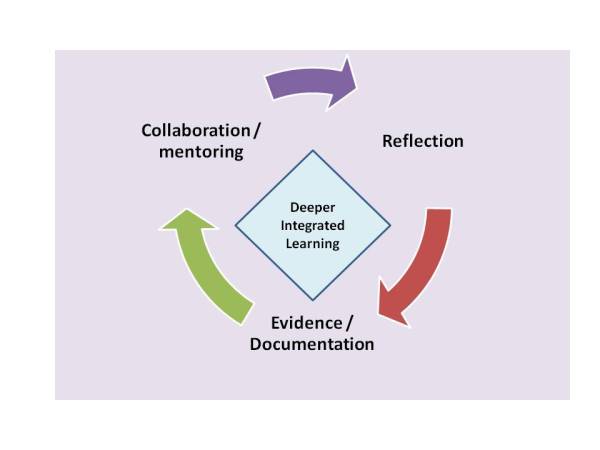Why Learning Portfolios?
“If you do not integrate your life’s experiences into a coherent whole — a comprehensive understanding of your struggles, failures, successes — then you will have difficulty understanding yourself. You will not achieve wisdom. You will experience despair.” Carl Alasko, Therapist and Columnist (Alasko, 2010)
- The process of developing Learning Portfolios helps learners develop deeper connections through a cycle of reflecting on their learning, connecting their reflections to evidence, and receiving and responding to feedback.
Alasko’s quote, relating a lack of integration with despair, comes from a column that includes discussion about the need to integrate one’s life experiences into a “coherent whole.” Alasko referenced Erik Erikson’s work on life stages, ego identity, and the value of reaching one’s later years with a sense that one’s life path has been meaningful.
A few months after reading Alasko’s column, I heard Melissa Peet, (now Director of Integrative Learning and Knowledge Management at the University of Michigan Ross School of Business), share examples of using a portfolio process to help individuals come to a more conscious awareness of and a deeper sense of integration with the core skills and knowledge they’ve gathered from key learning experiences in their lives, both formal and informal (ePortfolio California,2011; Peet, 2010). Because I’m deeply interested in practices that help people move toward integration and meaning, Peet’s talk inspired me to learn more about portfolio development processes as a self-discovery vehicle. Her work with the Integrated Knowledge Portfolio Process (IKPP) ™, lead me to a broader study of best practices developing around Learning Portfolio use and the discovery that Learning Portfolios are in wide use in many contexts (Cambridge, Cambridge, & Yancey, 2009; Lynch & Shaw, 2005; San Francisco State University,2013; University of Michigan, 2009; Virginia Tech & University of Georgia, 2013; Wright, 2001; Zubizarreta, 2009).
A common thread driving the growing use of Learning Portfolios is a goal of deepening students’ integrated learning – helping them better integrate their learning into a “big picture” framework that extends outside a particular course into other aspects of their lives. Personal Portfolios traditionally represent a showcase of a one’s work. Learning Portfolios also include examples of one’s work, but with the important addition of reflective thought related to that work, ideally developed with feedback from mentors and/or peers. Significant evidence shows that, reflective thinking and writing about one’s learning, in connection with specific examples of the fruits of that learning, help deepen and broaden learning of particular concepts and learning about one’s self.
This site will explore some key elements of Learning Portfolio practices, look at some ways they are being used, and provide some guidelines, recommendations, and examples to help you get started, whether you want to help your students by integrating a Learning Portfolio into a class you teach, or further your own journey of self-discovery by completing a personal Learning Portfolio exploring some key learning experiences selected from any stage and setting in your life.
References
Alasko, C. (2010, October 17). Balance Curbs Selfishness. The Monterey County Herald. Retrieved from http://www.montereyherald.com/carlalasko/ci_16362155
Cambridge D., Cambridge B., & Yancey K.B., (Eds.). (2009). Electronic Portfolios 2.0: Emergent Research on Implementation and Impact. Sterling, VA: Stylus.
ePortfolio California. (2011). AAC&U ePortfolio Forum Sessions. Retrieved from http://eportfolioca.org/training-a-support/aacau-eportfolio-forum-sessions
Lynch, B. & Shaw, P. (2005). Portfolios, Power and Ethics. TESOL Quarterly. 39(2) 263-297.
San Francisco State University. (2013). ePortfolio. Retrieved from http://eportfolio.sfsu.edu/
Peet, M. (2010) The integrative knowledge portfolio process: A Guide for Educating Reflective Practitioners and Lifelong Learners. MedEdPORTAL, June.
University of Michigan. (2009). MPortfolio. Retrieved from http://mportfolio.umich.edu/
Virginia Tech & University of Georgia. (2013). International Journal of ePortfolio. Retrieved from http://www.theijep.com/
Wright, W.A. (2001). The Dalhousie Career Portfolio Programme: A Multi-faceted Approach to Transition to Work. Quality in Higher Education. 7(2) 149-159.
Zubizarreta, J. (2009). The Learning Portfolio: Reflective Practice for Improving Student Learning (2nd Ed.). San Francisco: Jossey-Bass.
